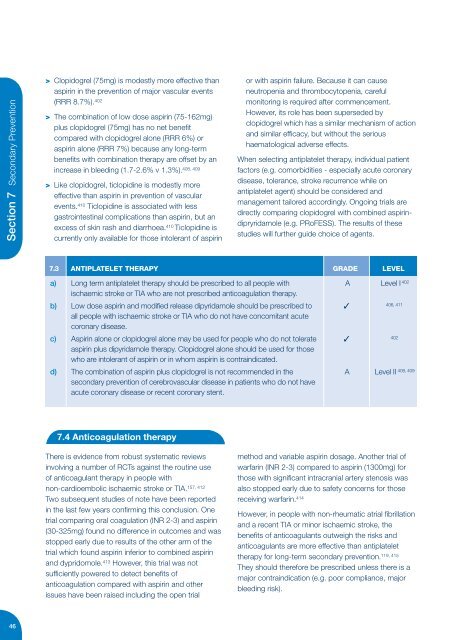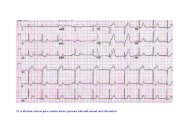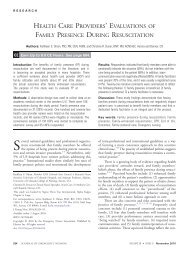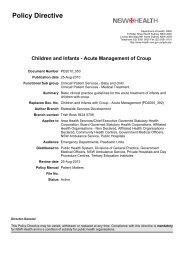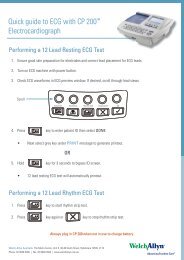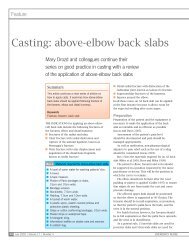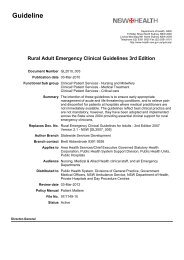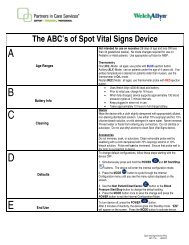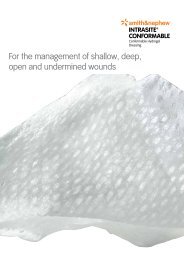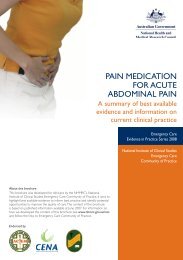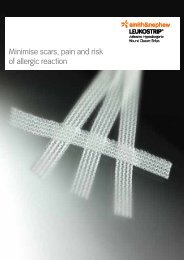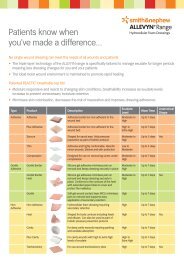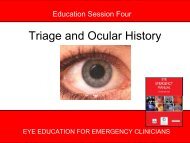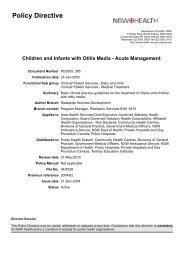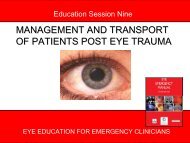Clinical Guidelines for Acute Stroke Management - Living on the EDge
Clinical Guidelines for Acute Stroke Management - Living on the EDge
Clinical Guidelines for Acute Stroke Management - Living on the EDge
Create successful ePaper yourself
Turn your PDF publications into a flip-book with our unique Google optimized e-Paper software.
S Sec<strong>on</strong>dary Preventio n<br />
ecti<strong>on</strong> 7<br />
> Clopidogrel (75mg) is modestly more effective than<br />
aspirin in <strong>the</strong> preventi<strong>on</strong> of major vascular events<br />
(RRR 8.7%). 402<br />
> The combinati<strong>on</strong> of low dose aspirin (75-162mg)<br />
plus clopidogrel (75mg) has no net benefit<br />
compared with clopidogrel al<strong>on</strong>e (RRR 6%) or<br />
aspirin al<strong>on</strong>e (RRR 7%) because any l<strong>on</strong>g-term<br />
benefits with combinati<strong>on</strong> <strong>the</strong>rapy are offset by an<br />
increase in bleeding (1.7-2.6% v 1.3%).<br />
408, 409<br />
> Like clopidogrel, ticlopidine is modestly more<br />
effective than aspirin in preventi<strong>on</strong> of vascular<br />
events. 410 Ticlopidine is associated with less<br />
gastrointestinal complicati<strong>on</strong>s than aspirin, but an<br />
excess of skin rash and diarrhoea. 410 Ticlopidine is<br />
currently <strong>on</strong>ly available <str<strong>on</strong>g>for</str<strong>on</strong>g> those intolerant of aspirin<br />
or with aspirin failure. Because it can cause<br />
neutropenia and thrombocytopenia, careful<br />
m<strong>on</strong>itoring is required after commencement.<br />
However, its role has been superseded by<br />
clopidogrel which has a similar mechanism of acti<strong>on</strong><br />
and similar efficacy, but without <strong>the</strong> serious<br />
haematological adverse effects.<br />
When selecting antiplatelet <strong>the</strong>rapy, individual patient<br />
factors (e.g. comorbidities - especially acute cor<strong>on</strong>ary<br />
disease, tolerance, stroke recurrence while <strong>on</strong><br />
antiplatelet agent) should be c<strong>on</strong>sidered and<br />
management tailored accordingly. Ongoing trials are<br />
directly comparing clopidogrel with combined aspirindipryridamole<br />
(e.g. PRoFESS). The results of <strong>the</strong>se<br />
studies will fur<strong>the</strong>r guide choice of agents.<br />
7.3<br />
ANTIPLATELET THERAPY<br />
GRADE<br />
LEVEL<br />
a) L<strong>on</strong>g term antiplatelet <strong>the</strong>rapy should be prescribed to all people with A Level I 402<br />
ischaemic stroke or TIA who are not prescribed anticoagulati<strong>on</strong> <strong>the</strong>rapy.<br />
b) Low dose aspirin and modified release dipyridamole should be prescribed to<br />
406, 411<br />
all people with ischaemic stroke or TIA who do not have c<strong>on</strong>comitant acute<br />
cor<strong>on</strong>ary disease.<br />
c) Aspirin al<strong>on</strong>e or clopidogrel al<strong>on</strong>e may be used <str<strong>on</strong>g>for</str<strong>on</strong>g> people who do not tolerate<br />
402<br />
aspirin plus dipyridamole <strong>the</strong>rapy. Clopidogrel al<strong>on</strong>e should be used <str<strong>on</strong>g>for</str<strong>on</strong>g> those<br />
who are intolerant of aspirin or in whom aspirin is c<strong>on</strong>traindicated.<br />
d) The combinati<strong>on</strong> of aspirin plus clopidogrel is not recommended in <strong>the</strong> A Level II<br />
408, 409<br />
sec<strong>on</strong>dary preventi<strong>on</strong> of cerebrovascular disease in patients who do not have<br />
acute cor<strong>on</strong>ary disease or recent cor<strong>on</strong>ary stent.<br />
7.4 Anticoagulati<strong>on</strong> <strong>the</strong>rapy<br />
There is evidence from robust systematic reviews<br />
involving a number of RCTs against <strong>the</strong> routine use<br />
of anticoagulant <strong>the</strong>rapy in people with<br />
n<strong>on</strong>-cardioembolic ischaemic stroke or TIA.<br />
157, 412<br />
Two subsequent studies of note have been reported<br />
in <strong>the</strong> last few years c<strong>on</strong>firming this c<strong>on</strong>clusi<strong>on</strong>. One<br />
trial comparing oral coagulati<strong>on</strong> (INR 2-3) and aspirin<br />
(30-325mg) found no difference in outcomes and was<br />
stopped early due to results of <strong>the</strong> o<strong>the</strong>r arm of <strong>the</strong><br />
trial which found aspirin inferior to combined aspirin<br />
and dypridomole. 413 However, this trial was not<br />
sufficiently powered to detect benefits of<br />
anticoagulati<strong>on</strong> compared with aspirin and o<strong>the</strong>r<br />
issues have been raised including <strong>the</strong> open trial<br />
method and variable aspirin dosage. Ano<strong>the</strong>r trial of<br />
warfarin (INR 2-3) compared to aspirin (1300mg) <str<strong>on</strong>g>for</str<strong>on</strong>g><br />
those with significant intracranial artery stenosis was<br />
also stopped early due to safety c<strong>on</strong>cerns <str<strong>on</strong>g>for</str<strong>on</strong>g> those<br />
receiving warfarin. 414<br />
However, in people with n<strong>on</strong>-rheumatic atrial fibrillati<strong>on</strong><br />
and a recent TIA or minor ischaemic stroke, <strong>the</strong><br />
benefits of anticoagulants outweigh <strong>the</strong> risks and<br />
anticoagulants are more effective than antiplatelet<br />
<strong>the</strong>rapy <str<strong>on</strong>g>for</str<strong>on</strong>g> l<strong>on</strong>g-term sec<strong>on</strong>dary preventi<strong>on</strong>.<br />
119, 415<br />
They should <strong>the</strong>re<str<strong>on</strong>g>for</str<strong>on</strong>g>e be prescribed unless <strong>the</strong>re is a<br />
major c<strong>on</strong>traindicati<strong>on</strong> (e.g. poor compliance, major<br />
bleeding risk).<br />
46


